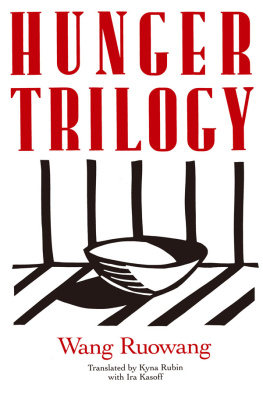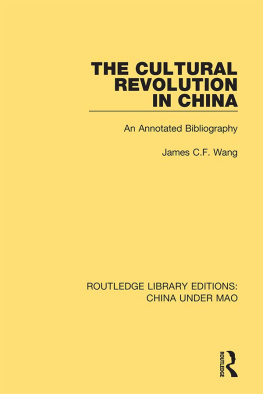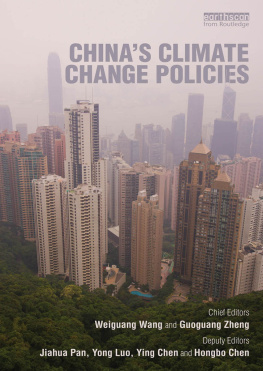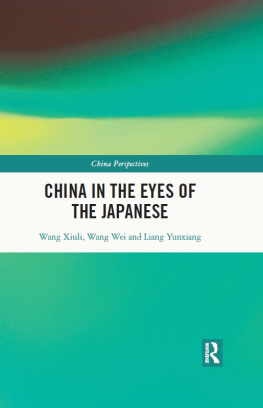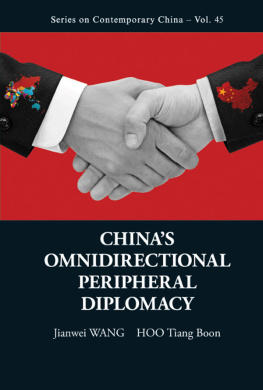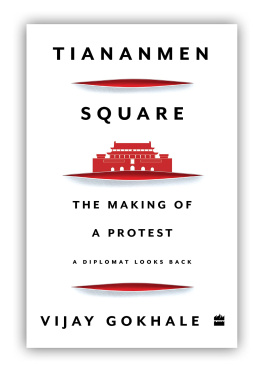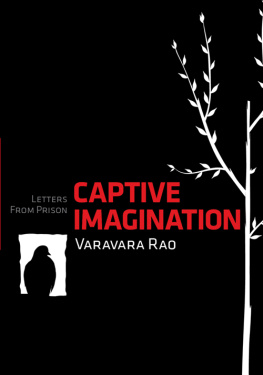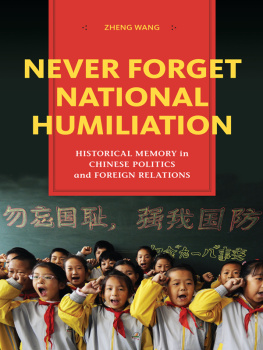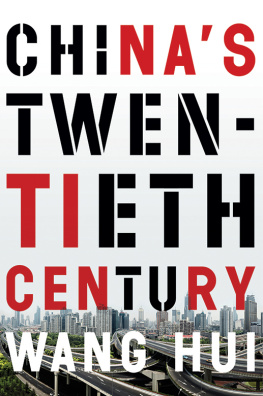Wang Ruowang
HUNGER
TRILOGY
An East Gate Book
First published 1991 by M.E. Sharpe
Published 2015 by Routledge
2 Park Square, Milton Park, Abingdon, Oxon OX14 4RN
711 Third Avenue, New York, NY 10017, USA
Routledge is an imprint of the Taylor & Francis Group, an informa business
Copyright 1991 Taylor & Francis. All rights reserved.
No part of this book may be reprinted or reproduced or utilised in any form or by any electronic, mechanical, or other means, now known or hereafter invented, including photocopying and recording, or in any information storage or retrieval system, without permission in writing from the publishers.
Notices
No responsibility is assumed by the publisher for any injury and/or damage to persons or property as a matter of products liability, negligence or otherwise, or from any use of operation of any methods, products, instructions or ideas contained in the material herein.
Practitioners and researchers must always rely on their own experience and knowledge in evaluating and using any information, methods, compounds, or experiments described herein. In using such information or methods they should be mindful of their own safety and the safety of others, including parties for whom they have a professional responsibility.
Product or corporate names may be trademarks or registered trademarks, and are used only for identification and explanation without intent to infringe.
Library of Congress Cataloging-in-Publication Data
Wang, Jo-wang
[Chi o san pu ch. English]
Hunger trilogy/by Wang Ruowang; translators, Kyna Rubin with
Ira Kasoff: introduction by Kyna Rubin.
p. cm.
Translation of: Chi o san pu ch.
Includes bibliographical references.
ISBN 0-87332-739-X(c) ISBM 8-87332-740-3(p)
I. Rubin, Kyna II. Kasoff, Ira E. III. Title.
PL2919.J6C3813
895.1352dc20
91-9017
CIP
ISBN 13: 9780873327404 (pbk)
ISBN 13: 9780873327398 (hbk)
To Wang Ruowang
Who has always outshined his jailers
through his dignity, wit, and persistence.
May these gifts help you now.
THIS English translation is based on the original Chinese text, Jie sanbuqu, which appeared in Shouhuo, 1980, 1: 11673. Peoples Literature Publishing House (Renmin wenxue chuban-she) subsequently reprinted the Chinese text in a 1983 collection of Wang Ruowangs fiction entitled Yanbuzhu de guangmang (The indistinguishable light). This version is not the same as the original and contains omissions of several passages that were politically sensitive at the time of printing. In 1984 East-West Culture Publishing Company in Hong Kong published another reprint entitled Guogong heiyu neimu (Inside the dark prisons of the KMT and CCP). This edition is based on the already edited version in Yanbuzhu de guangmang, but it goes a step further by adding subtitles not in the authors original text. This version also contains inaccuracies in Han Shanbis introduction about the author and the characters in the book.
I would like to express my deep appreciation to Timothy Cheek, Howard Goldblatt, Wu Dawei, Madelyn Ross, and Leo Ou-fan Lee for their support and guidance.
K.R.
KYNA RUBIN
THE TIME was 1988more than twenty years since the events described in together again in one room! laughed the twenty-two-year-old daughter of one of them. Her father, the ship captain, had been to dozens of countries, and in the wake of the Cultural Revolution had been jailed for being ideologically tainted by the outside world.
After reading Hunger Trilogy, perhaps it will be difficult for the reader to imagine that many of the intellectuals portrayed in This is a problem too large to tackle here, but a look at Hunger Trilogys depiction of the evolution of twentieth-century Chinese history, the Chinese Communist Party (CCP), and the evolution of the author himselfhelps illuminate the problematic subject of Chinese intellectuals and their relationship with the nation and state in this century. What has happened since Hunger Trilogy was written in 1979 may also help to explain the willingness of many Chinese intellectuals to look ahead rather than to dwell on the past.
Context
Wang Ruowang wrote Hunger Trilogy in 1979 at the height of the literature of the wounded (shanghen wenxue), which rocked the Chinese literary world with its harsh, realistic portrayal of human suffering brought on by the Cultural Revolution.3 Much of this literature was melodramatic, sentimental, and poorly written, but the key point at the time was that the party allowed it to be published at all (although its appearance certainly aided the cause of the post-Mao leadership).4 The year Hunger Trilogy was written also marked the emergence of a new literature that delves into life (ganyu shenghuo de wenxue), which adopted as its theme criticism of current political and social problems, thus moving away from a sole concern with exposing the atrocities of the Cultural Revolution. For its time, Hunger Trilogy differed from literature of the wounded because of a combination of factors: the relatively dispassionate tone of its author (this, despite the autobiographical aspect of the novella); its portrayal of the CCP before 1949 to set it off from the CCP of the Cultural Revolution; its central concern with hunger as a device illustrating the human potential for barbarity; and the fact that, like Liu Binyans Renyao zhijian (People or monsters?),5 the story itself is true, though strictly speaking it is not reportage.6 Most important, from the Chinese leaderships point of view, Hunger Trilogy went well beyond other literature of the wounded by tackling a previously taboo subject, a firsthand comparison of prison life under the KMT (Guomindang), on the one hand, and the CCP, on the other.
Parallels with Chinese Towering Wall Literature
Rather than examine Hunger Trilogy in the context of literature of the wounded, which it went well beyond in many ways,7 it is more useful to note its affinities with a relatively new genre of literature in contemporary China, which by the mid- to late 1980s was being increasingly referred to as towering wall literature (daqiang wenxue).
The term towering wall literature, as currently used in China, refers specifically to the body of post-Mao fiction depicting the life of political prisoners in labor camps from the 195758 antirightist campaign to the Cultural Revolution. It should not be confused with legal literature (fazhi wenxue), which as illustrated in the now defunct Shanghai magazine Daqiang neiwai (Inside and outside the towering wall), concerns itself with the present-day lives of petty criminals (as opposed to political prisoners) and cautionary tales about the hardships of prison life, the temptation of criminal activity, and the inevitability of capture for prisoners foolish enough to try escaping.8
Towering wall literature, as interpreted by one Chinese scholar in 1988 and apparently accepted by several others, is mainly exemplified by two writersCong Weixi, considered the father of this genre, and Zhang Xianliang, its younger uncle.9 In 1988 only about ten works of fiction by these two authors were considered part of the prison literature canon (the term is mine), making one question if such a small number of pieces actually constitute a bona fide school of literature. It seems natural that writers who had spent time in labor camps or prisons would write about their experiences over the course of the 1980s, as the literary censors loosened up and subjects that had been taboo for decades saw the light of day. But it is unclear to what extent one can label the publication of different writers accounts of their incarceration a particular kind of literature or even a trend. The notion of a school of prison literature is weakened by the fact that the scattering of works on this topic that did appear reflect a divergence of literary style and, more important, literary motivation.

